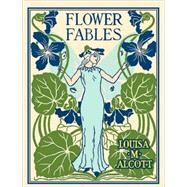Flower Fables
, by Alcott, Louisa May- ISBN: 9781557099549 | 1557099545
- Cover: Hardcover
- Copyright: 1/15/2005
The remarkable convergence of 19th century writers in Concord, Massachusetts may be glimpsed in this collection of stories inspired during visits to Walden Woods. The Alcott family often visited Henry David Thoreau to swim in the cove near his cabin or explore the changing seasons in this tranquil spot. With Thoreau as a guide, young Louisa May Alcott and the other children learned much about nature, but Louisa in particular delighted in another aspect of Thoreau's point of view. The very fact that he called the woods "Fairyland" opened up a new way of thinking in the young writer's mind. Whether he pointed out a new animal track, made a perfect bird call or discovered a bit of a cobweb and called it a fairy's handkerchief, it was all magic to Louisa and fodder for her lively imagination. On many of her walks around Walden, Louisa told original fairy stories to her sisters, Thoreau, and friends. One of these young friends was Ellen, the daughter of Ralph Waldo Emerson. Six years her junior, Ellenlooked up to Louisa the way Louisa looked up to Thoreau. Ellen was so captivated by the fairy stories that Louisa eventually wrote them down as a present for her. The entire Emerson family noticed and delighted in their young neighbor's generous gift, and shared their pleasure with Louisa's father. Mr. Alcott was equally impressed with his daughter's stories. He was a complex and unusual man -- a genius, according to Emerson. He was a remarkable father, if an uncertain provider. He believed in encouraging children - even girls -- to follow their dreams. The norm of the day was not to allow young ladies to tax themselves with such "brain work" as writing. The rest of Boston society might haveconsidered writing an improper occupation for a lady, but Mr. Alcott was proud and excited by his daughter's talent. He carried her fairy stories to George W. Briggs, a new publisher on Washington Street in Boston. Briggs decid







